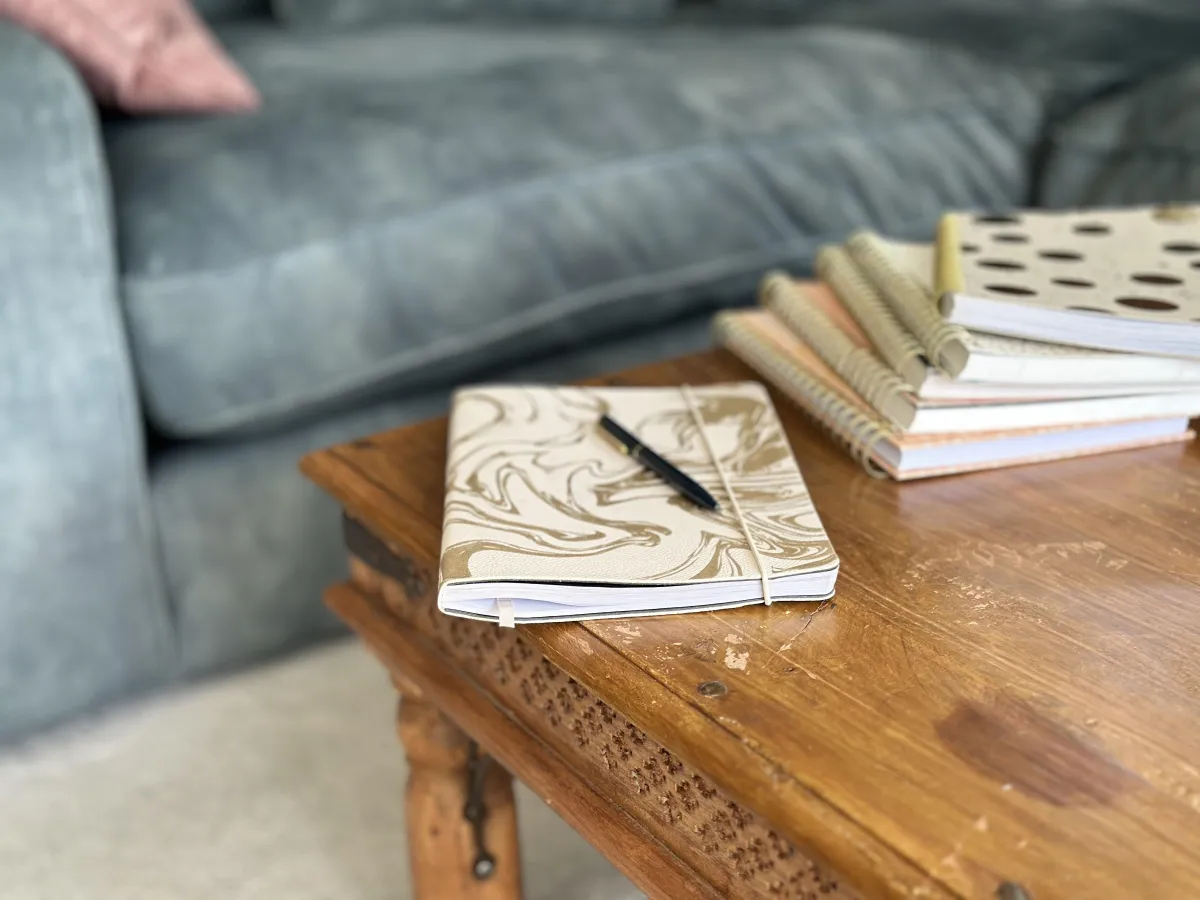
Unlock Your Potential: The power of daily journaling for corporate professionals
“ Journaling is like whispering to one's self and listening at the same time"
- Mina Murray
In the fast-paced world of corporate life, it's almost unavoidable to get caught up in the hustle and bustle, leaving little time for self-reflection and personal discovery.
Unless - we are intentional about making time for ourselves. Carving out a few moments each day for journaling can be a transformative practice that enhances your overall well-being and empowers you to thrive in the workplace and at home.
In this blog post, we'll explore the practical benefits of daily journaling for corporate professionals and how it can bring about self-reflection, well-being, well-thinking and empowerment in your life and career. So block out some time, grab a pen and notebook, make your favourite drink, and let's get some clarity
Harness the Power of Self-Reflection: At the core of journaling lies the power of self-reflection. By taking the time to write down your thoughts, experiences, and emotions, you embark on a journey of self-discovery. Through this process, you gain valuable insights into your thoughts and feelings, habits and patterns of behaviour. This newfound self-awareness enables you to make conscious choices, align your actions with your beliefs, and develop a deeper understanding of yourself as a human being as well as a professional.
Cultivate Wellbeing in the Workplace: Journaling is a therapeutic practice that nurtures your mental and emotional wellbeing. By putting pen to paper, you actually start noticing your thoughts and you start realising how your negative thoughts are weighing you down. Those negative thoughts are usually that cause of feeling stressed and experience anxieties that may have accumulated over time.
The act of journaling allows you to process your thoughts, untangle emotions, and gain clarity. It becomes a safe space where you can freely express your feelings and thoughts, your aspirations and visions, challenges and successes, fostering a sense of balance and inner peace within the corporate environment. The journaling exercise connects you deeper to your inner self. Which may sound a bit too mushy for the Corporate Professional, but that is exactly where your personal power lies.
Empower Yourself to make an Impact: As a corporate professional, you aspire to reach new heights and achieve your goals as you aim for validation in everything you do. Journaling is a catalyst that allows you to view your goals and aims with more clarity and empowers you to create a roadmap to turn those aspirations into reality by documenting progress.
Journaling enables you to break down big goals into manageable tasks, track your achievements, and celebrate milestones along the way. It also enables you to view your big goals from a bird's eye perspective to evaluate whether your initial goals are still valid and true to you. This process not only keeps you focused and motivated but also provides a tangible record of your growth, reminding you of the tremendous potential you possess and eliminates false aims you might have pursued otherwise.
Inspire and Connect: Your journal can become a wellspring of inspiration not only for yourself but also for others. As you reflect on your experiences and overcome challenges, consider sharing your insights with your colleagues or even starting a journaling group within your workplace. By sharing your journey, you can inspire and uplift others, creating a supportive community of professionals who strive for personal and professional growth.
Asking good questions: Good questions to guide you in your practice have are immensely powerful. When we first start out writing in our journal we either tend to fall into the To-Do-List habit or we are airing our mind by ranting about this and that. Or we simply stare at a blank page and don't know what to write.
Therefore good questions can help you guide and nurture your thinking in a way that it is not used to. For example:
Are those negative thoughts that hinder me to move forward / feel good / be proud of myself are really true ? Which encouraging thoughts would I choose instead if I could ?
What parts of me am I really proud of? What is it that I really do well and enjoy doing that lifts me up ?
When do I feel accomplished and fulfilled ?
Am I allowing myself enough time for self-care ? Or is the aspect of "Me" always coming last ?
What am I scared of and is that true or a real danger ?
What would living a good life actually look and feel like for me ?
Who am I trying to please by the constant need to thrive forward to achieve more ?
How can I be more present with my family and my team at work ?
Do I really need to do everything myself or what can I delegate ?
If work wasn't all consuming, what else would I like to do ?
Start your journaling journey - hints and tips:
To make the start of your journaling effort simple and to stop overthinking here are some highlights. Anytime that is undisturbed is a good time. Although first thing in the morning your mind is fresh and uncluttered from the day to focus on yourself. At the end of the day you usually find yourself reflecting on problem solving on how the day went. However, neither morning or evening is a wrong time.
Make journaling a regular exercise as a ritual that will then become a habit/routine over time. When you are intentional about blocking out some time for you (10min or 30min or 1h) your family members will honour your time when you do.
Get yourself a journal, one notebook where you jot down all of your thoughts, scribbles and create your plans. If you have multiple journals for different aspects you may get overwhelmed and then end up not journaling at all because it becomes too complicated.
Journaling is only for your eyes; like a conversation you have with yourself. You may want to go back and reflect on how your mind has become more clear. You may reflect on your journey and how you realised your plans, goals and desires over time. You may reflect on how you feel about yourself has changed over time.
You may want to make yourself your favorite cup of tea or drink, use a pen that you enjoy writing with (there is nothing worse than trying to write with a scratchy pen or one that is running out of ink)
Make yourself comfortable. Sit in your favorite chair or corner in the house. Away from your usual work desk space. You may even light a candle. Make it an enjoyable experience because this is YOUR time.
Or you might want to source a pre-guided journal, like the 6-minute journal (Success or Gratitude journals) or check out “businessinsider.com” the 11 best guided journals to figure yourself out, track goals, or give as gifts.
You may like to take inspiration from some famous people who are all practicing journaling, like Matthew McConaughey whose book “Green Lights” is based on a collection of decades of his journals. Emma Watson, Lady Gaga and Serena Williams are known to stay in tune with their thoughts, write down their feelings that help getting clear on negative thoughts and emotions and detangle a sense of feeling stuck.
Other famous people from history are well known for their journals, like Leonardo da Vinci, Anne Frank, Mark Twain and Charles Darwin. You can find more inspiration and guidance via the Bullet Journal Method by Ryder Carroll or Julia Cameron’s “The Artist's Way” which guides you on a deeper understanding of yourself and your creative path.

© Copyright 2023 SusanneKubik.com - The Self-Leadership Effect

